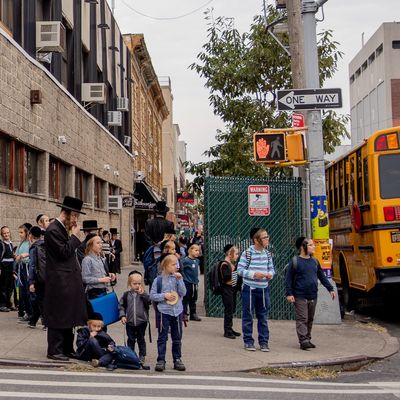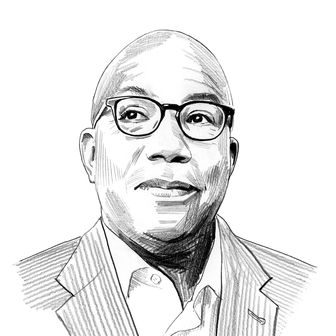
It’s surely not in the top ten concerns of most New Yorkers, but the long-running battle to make sure all ultra-Orthodox and Hasidic yeshivas provide a minimally adequate education — as required by state law — is a fight that matters for people of all faiths.
“A lot of people don’t know that at the moment, you can start a school in New York State and operate it for years without anyone even knowing of your existence. The only thing you need to be concerned with is the fire code — but no one is concerned about ensuring the kids going into that school are in fact, attending a school and are being provided an education,” says Naftuli Moster, the founder of Young Advocates for Fair Education (YAFFED), an organization that has been fighting for years to get city and state officials to enforce Section 3204 of state education law — which requires that kids enrolled in private and parochial institutions get instruction “at least substantially equivalent” to that at local public schools.
That loose “substantially equivalent” language and a lack of clarity on how to enforce it has been a huge loophole for decades, says Moster. While most of the city’s 275 or so yeshivas do a fine job — and some are spectacular — he says thousands of New York students, including him, have been deprived of a basic education.
“It’s so hard to even explain to average New Yorkers what it means to grow up with practically no education,” Moster told me (our full conversation is online at You Decide, my podcast). “In elementary and middle school we got a maximum of 90 minutes of secular education a day, focused on basic English and arithmetic — and even that was at the end of the school day, like an after-school program, taught by unqualified teachers. And then once we entered high school, we got no secular education at all. And by that I include basic English and arithmetic, let alone any science or social studies. And this is the case for tens of thousands of children in New York State right now.”
Moster, who graduated from high school unfamiliar with words like “molecule,” “essay,” and “Constitution,” managed to get through college thanks to hard work and grit. But it should never have come to that.
“This is not just a problem for the Hasidic community, which of course it is because this results in high rates of poverty, and dependence on government assistance,” Moster said. “But it’s really an issue that affects all New Yorkers because their taxes fund these yeshivas.”
Until lately, the response by city and state authorities to these complaints of educational neglect has been a public embarrassment. Ex-mayor Bill de Blasio vowed to investigate, but a probe that began in 2015 — one that de Blasio’s schools chancellor, Carmen Farina, first estimated would take a couple of months — dragged on, inconclusively, for years. De Blasio’s own Department of Investigation Commissioner concluded that “political horse-trading unquestionably occurred,” with an interim report on yeshiva education delayed until after his 2017 reelection and after the state legislature reauthorized mayoral control of the school system.
At the state level, the legislature created a carve-out for yeshivas (known as the Felder Amendment for its sponsor, Senator Simcha Felder of Brooklyn) that further muddled the already fuzzy issue of how to assess and enforce the “substantially equivalent” rules.
The good news is that Acting Supreme Court Justice Adam Silverman issued a ruling this week that, in effect, tells city and state officials to cut the crap, stop the stonewalling and enforce the law. Silverman’s blistering 30-page opinion fittingly starts with an excerpt from the 1954 U.S. Supreme Court ruling in Brown v. Board of Education that struck down racial segregation in public schools: “In these days, it is doubtful that any child may reasonably be expected to succeed in life if he [or she] is denied the opportunity of an education.”
Silverman explicitly ordered an end to the runaround being given to Beatrice Weber, the mother of a middle-schooler attending Yeshiva Mesiva Arugath Habosem where, she says, he’s getting a rushed and inadequate end-of-day cramming of “secular” subjects. Although Weber wanted her son in a different school, her ex-husband insisted that he attend YMAH as part of the terms of their divorce.
“The one in question is my tenth child and my sixth son. I’m not new to the issues in the yeshiva systems,” Weber told me. “I didn’t have a choice of where to send my son because of my divorce agreement. I did go through the process of meeting with the school principal, asking him for a curriculum, asking him for a schedule, emailing again, asking again. So I went through all of that, and they had nothing to show me.”
So she sued. The case bounced around in Family Court and Supreme Court, with fights over whether Weber was entitled to demand that the State Education Commissioner investigate the school’s adequacy. Silverman ordered that the endless motions and delays come to a halt.
“This court finds it unreasonable to still not have a determination on the merits, let alone a completed investigation regarding allegations made in September of 2019 when it is now June of 2022 … there should be no reason why a determination cannot be reached within the next four months,” the ruling says.
At which point we may have an answer to some simple questions. Is this school (and others like it) meeting its legal obligation to teach basic education? If not, what should be the consequences? And what should happen to kids who aren’t learning?
“It’s very frustrating. I look forward to the summer when I can give him some extracurriculars,” Weber told me. “Last year, he went to the American Museum of Natural History for a week, their space program. And he was blown away. I’d love to give him some coding classes. I’m trying to supplement it.”
“I feel like he’s going to be in high school before any of this even becomes something that practically changes his life,” says Weber. “But for the broader community, things will seem right in ten years … five years, things will look different.”






























